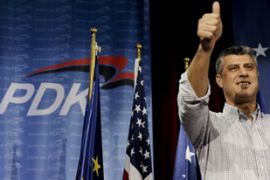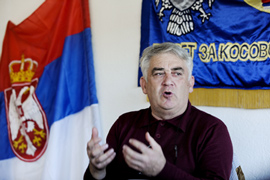Kosovo PM claims election win
Breakaway territory holds first vote since declaring independence from Serbia.

“Today we gave freedom, independence and democracy its full meaning,” Thaci told his supporters.
The junior partner in the governing coalition claimed it won in several areas, including the capital Pristina, while opposition parties contested Thaci’s outright victory and urged people to wait until final results came out.
Albanian rivalry
No major instances of unrest or fraud allegations were reported, though the run-up had been marred by tensions between rival ethnic Albanian parties, as well as the possibility of a boycott from the Serb minority.
Stones were thrown at Thaci’s convoy on Wednesday, and there was an apparent assassination attempt on Thursday on an opposition mayoral candidate.
|
“This vote here shows that … the fear … is loosening its grip” Momcilo Trajkovic |
Thaci had urged the country’s 100,000 Serbs to ignore calls by Belgrade and the Serb Orthodox Church to boycott the vote, calling it a key test for his new nation.
So far, 63 countries have recognised Kosovo, including the United States and most European countries. Serbia has vowed to block further recognition and has Russia’s support.
“I’m sure we will have success and appreciate very much the participation of all citizens, in particular Serbs of Kosovo,” Thaci told The Associated Press news agency after he voted.
More than 5,000 officers were on patrol during the vote, which was the first to be organised by Kosovo officials.
Previous elections were run by the United Nations, which took control of Kosovo in 1999 after Nato waged an air campaign to stop the Serbian forces of former leader, Slobodan Milosevic, brutally ethnic Albanian separatists.
“This is the best of democracy, and I will do my duty as a citizen,” Zoje Bujupi, an ethnic Albanian, said.
Boycott ignored
Election officials said 45 per cent of the 1.5 million registered voters cast ballots, a slight increase from the 2007 election turnout when 40 per cent voted.
Kosovo’s first UN-run poll in 2000 saw an 80 per cent turnout.
 |
| Trajkovic ran for mayor of Gracanica despite Belgrade’s calls for a boycott of the vote [AFP] |
One Serb leader running for a mayoral seat ignored the call to boycott to vote from Belgrade and cast his ballot in the Serb enclave of Caglavica, just outside the capital, Pristina.
“This vote here shows that … the fear … is loosening its grip,” Momcilo Trajkovic said.
He said the fact that Serbs were voting was a sign of better times for the minority population, which decreased by a third after the war ended in 1999 and many left to live in Serbia.
Vuk Jeremic, Serbia’s foreign minister, said Belgrade did not recognise elections organised by “the so-called Republic of Kosovo,” but would not “retaliate” against the Serbs who take part.
“Kosovo is an integral part of Serbia, and it will always be so,” Jeremic said.
In the ethnically divided town of Mitrovica, where less then one per cent of votes were cast, a Serbian government official based in Kosovo suggested the Serb participation this year could signal a rift within the Serb minority.
“Today’s election is a serious challenge for the Serbian authorities here,'” Oliver Ivanovic told the Associated Press.
“In time it will be a test of confidence in Serbia’s rule. The possible serious participation of Serbs in these elections could duplicate power on the ground, and that would be very dangerous.”
Many of Kosovo’s Serbs still recognise the Belgrade government as their own.